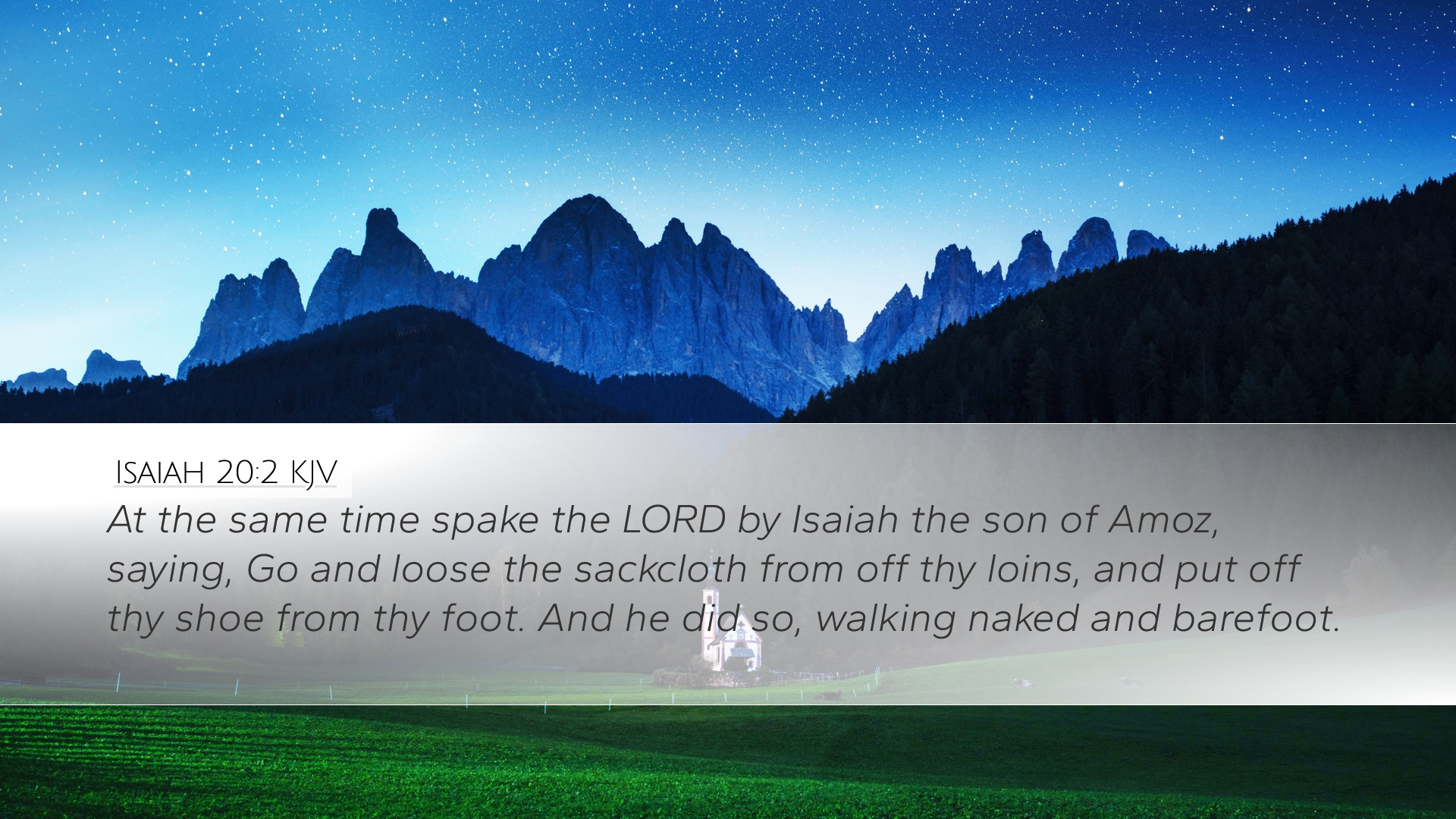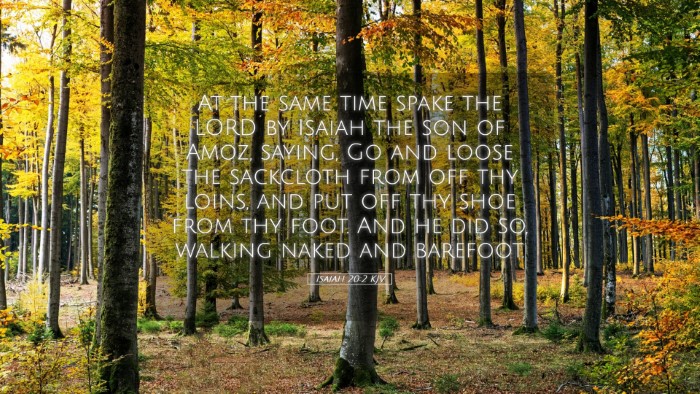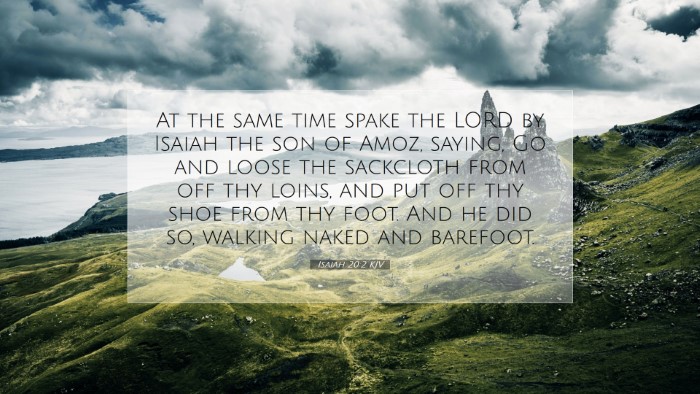Commentary on Isaiah 20:2
Isaiah 20:2 states: "At the same time spake the Lord by Isaiah the son of Amoz, saying, Go and loose the sackcloth from off thy loins, and put off thy shoes from thy feet. And he did so, walking naked and barefoot." This verse presents a significant moment in the prophetic ministry of Isaiah, marked by a striking command from God.
Context and Overview
Isaiah, a major prophet of the Old Testament, prophesied during a tumultuous period in Israel's history. The events surrounding Isaiah 20 occurred when Assyria was threatening the surrounding nations, including Israel and Judah. Utilizing vivid symbolism, God often conveyed His messages through the actions of His prophets. In this particular instance, God instructs Isaiah to engage in a physical act of prophetic demonstration that serves a dual purpose: to underscore the impending judgment and convey His message to His people.
Insights from Matthew Henry
According to Matthew Henry, the nakedness and being barefoot symbolize the utter defeat and humiliation that await the nations like Egypt whom Isaiah is prophesying against. Henry reflects on the seriousness with which God conveys impending judgments, indicating that while the physical state of nudity may seem shocking, it serves a crucial role in conveying divine messages. The act of walking barefoot signifies a state of mourning and humiliation, applicable not only to the immediate target of prophecy but also to the people of God who are about to witness the degradation of their former allies.
Insights from Albert Barnes
Albert Barnes elaborates on the significance of this prophetic action as an expression of disgrace. He emphasizes that during ancient times, the practice of walking naked or barefoot in a prophetic context typically typified dire circumstances that were about to unfold. He interprets Isaiah's action as the culmination of a divine communication process meant to instill fear and urgency among the people regarding their alliance with Egypt. Furthermore, Barnes posits that such prophetic symbolism served to reveal God’s sovereignty over the nations and their fates, giving credence to the warning that reliance on human powers would result in catastrophic disappointment.
Insights from Adam Clarke
Adam Clarke provides a thorough examination of the cultural and historical backdrop behind Isaiah's prophetic action. He suggests that the act of undressing was not merely an exhibition but a profound engagement in the prophetic narrative that reflects God's profound seriousness towards Israel's flirtations with foreign powers. Clarke points out that the command to walk 'naked and barefoot' symbolizes both physical and spiritual desolation. He also references historical customs which would have made this act resonate powerfully with the audience of the time, thus enhancing its intended impact.
Theological Implications
The theological implications of Isaiah 20:2 are profound and multifaceted. The act of Isaiah serves as an object lesson that probes into the nature of reliance and trust in God versus human alliances. Such prophetic acts reflect God’s displeasure with Israel's tendency towards idolatry and dependence on foreign powers. The message echoes the call to repentance and a return to true faithfulness toward God.
Symbolism of Nakedness
The symbolism of nakedness in this verse can be interpreted as a metaphor for vulnerability and exposure before God. In biblical literature, nakedness often represents shame (cf. Genesis 3:10) and moral failing. It serves to illustrate the state of the nations that forsake God. In the same vein, the expectations on God’s people emphasize that true security lies not in military alliances but in a covenant relationship with God.
Prophetic Actions as Teachings
Prophetic actions in the biblical canon were integral to conveying divine messages. Isaiah's action serves to invite observers to ponder deeper truths about their social and spiritual conditions. The power of such symbolic gestures is seen throughout Scripture, highlighting their status as a vital aspect of prophetic ministry. This instance in Isaiah is a reminder that God's communication with humanity can transcend ordinary discourse, engaging the senses to impart a visceral understanding of divine reality.
Application for Today
For pastors, theologians, and Bible scholars, Isaiah 20:2 serves as a pertinent illustration of the seriousness of divine judgment and the need for faithfulness to God amid competing earthly powers. When preaching or teaching this passage, it is crucial to address the dimensions of cultural context and prophetic symbolism. This commentary reminds us that as modern believers, vigilance against idolatry—whether in the form of secularism, militarism, or misplaced trust in human efforts—is paramount. The challenge remains for contemporary audiences to discern what modern 'nakedness' or shame looks like in their lives spiritually.
Encouragement for Faithfulness
The overarching theme in Isaiah 20:2 is a clarion call for faithfulness and reliance on God. In an age where dependency on earthly systems is prevalent, the text invites a reassessment of trust and loyalty. The humiliation promised to those who forsake God serves both as a warning and an encouragement for believers to seek God genuinely and forsake the allure of transient human agreements.
Conclusion
Isaiah 20:2 is more than a historical account; it reflects the ongoing dialogue between God and humanity about trust, reliance, and the dire consequences of turning away from divine allegiance. Drawing insights from the commentaries of Matthew Henry, Albert Barnes, and Adam Clarke provides depth to our understanding and offers avenues for reflection and application in our contemporary settings. This verse challenges us to take prophetic words seriously, to remain vigilant in our faith, and to engage in sincere worship that acknowledges God's ultimate authority over our lives.


